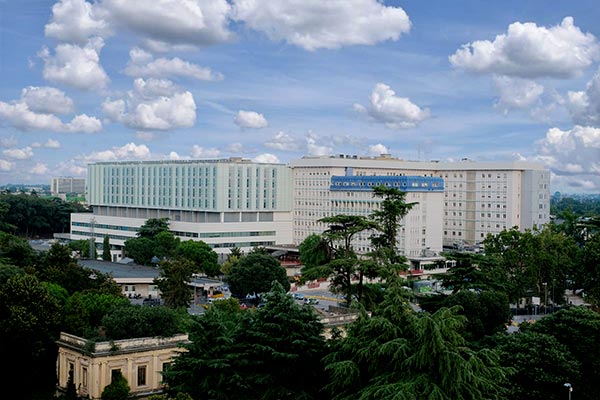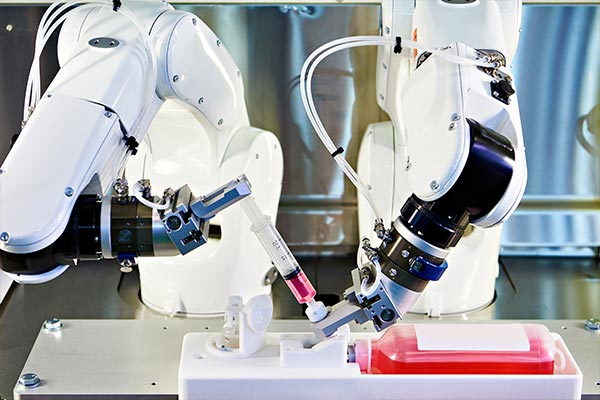- Autori:
-
Carbone, Carmine; De Luca, Roberto; Puca, Emanuele; Agostini, Antonio; Caggiano, Alessia; Priori, Lorenzo; Esposito, Annachiara; Ascrizzi, Serena; Piro, Geny; Salvatore, Lisa; De Sanctis, Francesco; Ugel, Stefano; Corbo, Vincenzo; Neri, Dario; Tortora, Giampaolo
- Titolo:
-
Antibody-based delivery of interleukin-2 modulates the immunosuppressive tumor microenvironment and achieves cure in pancreatic ductal adenocarcinoma syngeneic mice
- Anno:
-
2025
- Tipologia prodotto:
-
Articolo in Rivista
- Tipologia ANVUR:
- Articolo su rivista
- Lingua:
-
Inglese
- Formato:
-
Elettronico
- Referee:
-
No
- Nome rivista:
- JOURNAL OF EXPERIMENTAL & CLINICAL CANCER RESEARCH
- ISSN Rivista:
- 1756-9966
- N° Volume:
-
44
- Numero o Fascicolo:
-
1
- Intervallo pagine:
-
1-19
- Parole chiave:
-
Chemotherapy; Immunocytokines; Orthotopic syngeneic mouse models; Pancreatic cancer
- Breve descrizione dei contenuti:
- BackgroundPancreatic ductal adenocarcinoma (PDAC) is one of the most aggressive and deadly type of cancer, with an extremely low five-year overall survival rate. To date, current treatment options primarily involve various chemotherapies, which often prove ineffective and are associated with substantial toxicity. Furthermore, immunotherapies utilizing checkpoint inhibitors have shown limited efficacy in this context, highlighting an urgent need for novel therapeutic strategies. This study investigates the preclinical efficacy of an innovative targeted therapy based on antibody-cytokine fusion proteins, specifically interleukin-2 (IL-2), a pivotal driver of cell-mediated immunity, fused to L19 antibody, which selectively binds to extra domain B of fibronectin (EDB-FN1) expressed in the tumor microenvironment.MethodsWe tested the effectiveness of different immunocytokines through in vivo characterization in syngeneic C57BL/6J orthotopic mouse models of PDAC. Based on these results, we decided to focus on L19-IL2. To assess the efficacy of this immunocytokine we developed an ex-vivo immune-spheroid interaction platform derived from murine 3D pancreatic cultures, and telomerase reverse transcriptase (TERT) specific T-lymphocytes. Moreover, we evaluated the anti-cancer effect of L19-IL2 in combination with standard therapy in vivo experiments in PDAC mouse models. Tumor samples collected after the treatments were characterized for tumor infiltrating immune cell components by bulk RNA sequencing (RNA-seq) and spatial transcriptomics (Stereo-seq) analysis.ResultsThe tumor-targeted L19-IL2 fusion protein demonstrated potent, dose-dependent anti-tumor activity in mice with pancreatic tumors resistant to standard chemotherapy. Spatial Transcriptomics (ST) and RNA-seq analyses indicated that L19-IL2 treatment induced a significant influx of immune cells into the tumor microenvironment, with these cells expressing activation markers like granzymes, perforins, and the IL-2 receptors.ConclusionsOur results demonstrated that L19-IL2 enhances immune infiltration and cytotoxicity, remodeling the "cold" tumor microenvironment (TME) in PDAC. This innovative antibody-cytokine fusion protein improves therapeutic outcomes, paving the way for novel targeted treatment strategies in PDAC.
- Id prodotto:
-
143738
- Handle IRIS:
-
11562/1149627
- ultima modifica:
-
26 gennaio 2025
- Citazione bibliografica:
-
Carbone, Carmine; De Luca, Roberto; Puca, Emanuele; Agostini, Antonio; Caggiano, Alessia; Priori, Lorenzo; Esposito, Annachiara; Ascrizzi, Serena; Piro, Geny; Salvatore, Lisa; De Sanctis, Francesco; Ugel, Stefano; Corbo, Vincenzo; Neri, Dario; Tortora, Giampaolo,
Antibody-based delivery of interleukin-2 modulates the immunosuppressive tumor microenvironment and achieves cure in pancreatic ductal adenocarcinoma syngeneic mice
«JOURNAL OF EXPERIMENTAL & CLINICAL CANCER RESEARCH»
, vol.
44
, n.
1
,
2025
,
pp. 1-19
Consulta la scheda completa presente nel
repository istituzionale della Ricerca di Ateneo 








